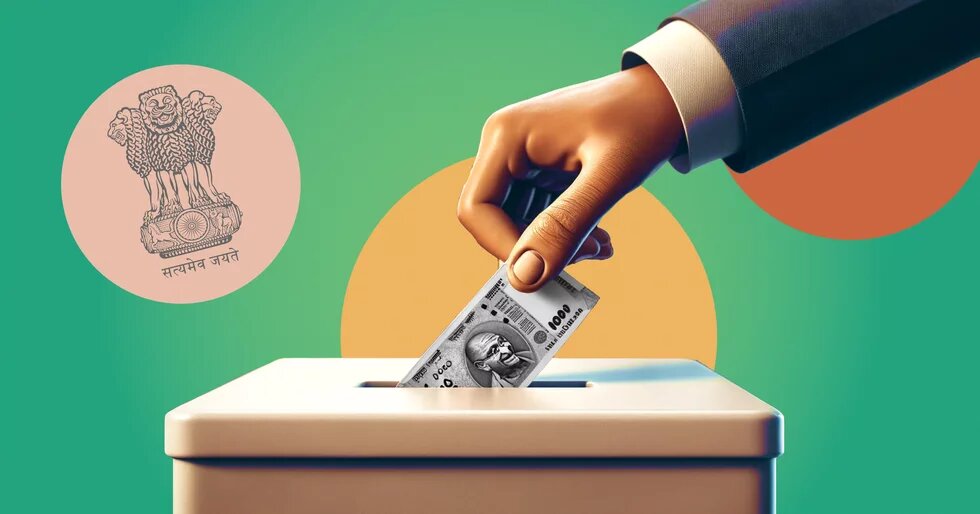Reforming political funding in India is crucial for a transparent, accountable and equitable democracy.

India’s highest court, the Supreme Court on 15 February 2024 adjudged that citizens have a right to know which corporate entities fund India’s political parties.1 It did so while holding the ‘Electoral Bonds’ scheme of the federal government to be unconstitutional. The scheme, put in place by the Bharatiya Janata Party (BJP)-led Union government in 2017, permitted unaccounted money to be secretly funnelled into political parties from within and outside India in a manner that most benefited the political party in power.2
Historically India’s electoral politics has been largely funded through dark channels of unaccounted cash. A smaller part of funding of political parties was via banking channels. The influx and influence of unaccounted money and the role of money into electoral politics increased manifold after India liberalised its economy in the 1990s and the contribution of the private sector in India’s national income went up substantively. The introduction of electoral bonds - a bearer financial instrument that donors could hand over to political parties anonymously made it worse by giving a legal cover to the potential regulatory capture and illegal political-business relations.
The increased flow of funds into electoral politics starting from the 1990s required an enhanced independent oversight and regulatory checks. That did not happen. Successive governments, of different political hues, failed to initiate reforms to match the resources being ploughed into India’s electoral politics.
In India, a constitutionally-mandated body, the Election Commission is in charge of ensuring fair, independent and transparent elections to parliament at national and state-level. The Commission has achieved considerable success in increasing voter participation and voting transparency, but it has not been enabled by the executive to achieve similar success in curtailing either the influence of unaccounted money in India’s politics or in ensuring transparency on this count.
Laws put a cap on the expenses by individual candidates in different elections. But they do not limit expenditure by political parties. Laws permit the Election Commission to review the expenses by individual candidates but the political parties provide self-audited annual balance sheets of their incomes and expenditures that sit beyond scrutiny.
Combined with the free hand on spending to the political parties, the caps on spending by individual candidates are arbitrary and impractical for the diverse nature of Indian political constituencies. At present a candidate for parliamentary elections is permitted to spend between Rs 75 lakhs to Rs 95 lakhs (USD 90,529 to USD 114,670 at current market prices).3 Against this one-size-fit-all cap, consider this: The number of voters in the largest five parliamentary constituencies are more than 15 times that in the smallest ones. The Election Commission maintains an elaborate bureaucracy and machinery to review this ‘official’ expenditure and yet it fails to substantively check the illegitimate expenditure by the candidates and that by the party.
This lopsided regulatory system which part-focuses on expenditures by the politicians but one which cannot regulate or have an oversight on the sources of ‘income’ of the political actors has led to a pervasive crony-capitalism at all levels of Indian governance. In 2023, India’s rank fell further to 93 out of 180 on the Corruption Perception Index of Transparency International.4 This influence of dubious money and its effect on India’s governance worsened with the introduction of the opaque electoral bonds in 2017.
The symptoms of this systemic failure emerge in regular reporting of corruption scandals at all levels. The dubious awarding of contracts and signing off on the country's natural and raw assets, such as minerals; the opaque licensing and permit systems for different industries; the selective and enthusiastic investigation by enforcement agencies into corruption by politicians that are not aligned with parties in power; legislative and regulatory capture by corporate interests; opaque and questionable distribution of government work contracts (in an economy where governments continue to make substantial capital investments into the growing economy).
The Impact
These systemic dark spots in political funding lead to degradation of citizen’s rights, an inefficient economy and an imbalanced distribution of the fruits of economic growth.
Because of the pernicious caste system, historically, the accumulation and control of capital in India has been concentrated in the hands of a few designated as ‘upper caste’. This capital, in the face of a corrupted political funding system, tends to overwhelmingly support entrenched privileged classes and political actors at the cost of those from historically-marginalised, electorally-minor and/or economically-deprived communities.
Even when social mobilisation by the marginalised communities in India throws up new representative political actors (individuals as well as political formations), the ones that succeed from this segment are more often the ones willing to follow the game as per existing rules. Those seeking transformative changes through electoral politics are unable to succeed. A perverse form of distributive corruption quickly eats up any hope of transformative politics. This distributive corruption within the electoral funding landscape works, to put in oversimplified terms perhaps, in three steps.
The candidate tries to capture agency over the social mobilisation, becoming its public face. Then convince the ones holding capital to back (read: fund) his or her political candidacy as a safe ‘investment’. If successful, the candidate then participates in the same crony-capitalism market but is able to divert a relatively higher share of the fruits of this market to those from her or his ‘community’, establishing a patronage chain that provides a sense of economic and political empowerment.
One can see this play out in stories of prominent political actors, such as Mayawati and Lalu Prasad Yadav who rose up from historically marginalised communities, brought about a change in India’s political and social map but then were tainted with allegorical allegations of ‘corruption’ even as their communities continued to see them as symbols of social and political emancipation.
The party in power at the Centre, BJP has also reiterated its faith in the discredited electoral bonds system, claiming it would have been better to tweak it a little rather than discard it entirely, as India’s top court has done. Most of the political parties in opposition have also not enunciated any clear proposal for reforms on the front. This suggests a lack of political momentum to bring positive changes to the political funding regulations in India.
Against this scenario, the Election Commission and successive Law Commissions5 have argued for a set of reforms that brings greater transparency and scrutiny to political funding. State funding of electoral politics has also been put on the table by different government and non-government bodies but no concerted effort has been made to act on either of these priorities by political parties when in power.
Towards Reform
Electoral and political funding that centerstages the principles of transparency and accountability is essential to make India’s democracy function better for its citizens and be less amenable to vested interests. The third principle, of equity, must also be at the heart of such reforms. This requires that political candidates and parties representing or stewarding the rights of marginalised segments of Indian society get a fair opportunity to also raise funds just as those from socially or financially dominant segments get. But, at this juncture, such reforms look like a distant dream.
Disclaimer:
This article was prepared with the support of the Heinrich Böll Stiftung. The views and analysis contained in the publication are those of the author and do not necessarily represent the views of the foundation. Heinrich Böll Stiftung will be excluded from any liability claims against copyright breaches, graphics, photographs/images, sound document and texts used in this publication. The author is solely responsible for the correctness, completeness and for the quality of information provided.
Footnotes
- 1
Supreme Court of India 2024, Writ Petition (C) No. 880 of 2017, https://main.sci.gov.in/supremecourt/2017/27935/27935_2017_1_1501_50573…
- 2
Association for Democratic Reforms 2023, Electoral Bonds and Opacity in Political Funding, https://adrindia.org/sites/default/files/Background%20Note_Electoral%20Bonds_June%202022.pdf Nitin Sethi 2019-22, “Paisa Politics: Exposing The Govt's Electoral Bonds Fraud”, https://www.reporters-collective.in/projects/paisa-politics-exposing-the-electoral-bonds-fraud
- 3
Election Commission of India 2022, https://old.eci.gov.in/files/file/13928-limits-of-candidate%E2%80%99s-e…
- 4
Transparency International, https://www.transparency.org/en/countries/india
- 5
Law Commission of India 2015, Report Number 255 Electoral Reforms, https://cdnbbsr.s3waas.gov.in/s3ca0daec69b5adc880fb464895726dbdf/upload…;


